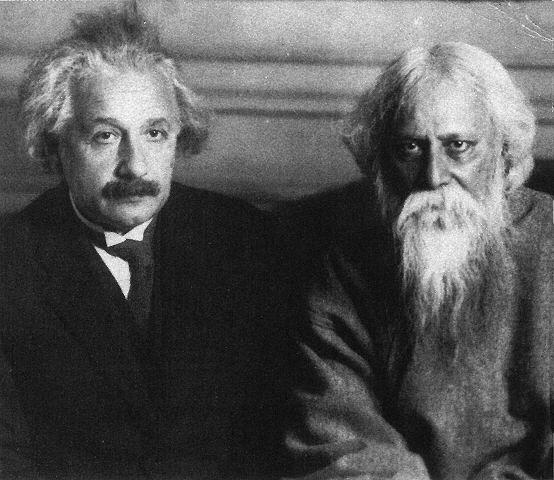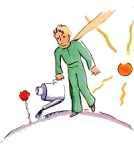I agree with the quote; at least my experiences really show that. There is a undoubtedly a stronger connection with certain people; regardless of time. There is more to "taming" than time. There is also that distance aspect.
I thought this quote worked well in with "The Little Prince" post below. I stole the Tagore quote from my friend Sandra's facebook status, and although I didn't know anything about Rabindranath Tagore then, I know at least a little now.

(The guy on the right)
Wikipedia says: As a poet, novelist, musician, and playwright, he reshaped Bengali literature and music in the late 19th and early 20th centuries. As author of Gitanjali and its "profoundly sensitive, fresh and beautiful verse",[1] being the first non-European to win the 1913 Nobel Prize in Literature[2], Tagore was perhaps the most important literary figure of Bengali literature and a mesmerising representative of the Indian culture whose influence and popularity internationally perhaps could only be compared to that of Gandhi whom Tagore named 'Mahatma' out of his deep admiration for him.
Tagore denounced the British Raj and supported independence. His efforts endure in his vast canon and in the institution he founded, Visva-Bharati University. Tagore modernised Bengali art by spurning rigid classical forms. His novels, stories, songs, dance-dramas, and essays spoke to political and personal topics.
Ok, so what does that mean? Well, let's look at his stories...
The four years from 1891 to 1895 are known as Tagore’s "Sadhana" period (named for one of Tagore’s magazines). This period was among Tagore's most fecund, yielding more than half the stories contained in the three-volume Galpaguchchha, which itself is a collection of eighty-four stories. Such stories usually showcase Tagore’s reflections upon his surroundings, on modern and fashionable ideas, and on interesting mind puzzles (which Tagore was fond of testing his intellect with). Tagore typically associated his earliest stories (such as those of the "Sadhana" period) with an exuberance of vitality and spontaneity; these characteristics were intimately connected with Tagore’s life in the common villages of, among others, Patisar, Shajadpur, and Shilaida while managing the Tagore family’s vast landholdings.
Download the Sadhana period audiobook here, and buy the book here.
Also, while looking for a picture of him, I stumbled upon someone else who had stumbled upon this:
JULY 14, 1930 ON THE NATURE OF REALITY
[Excepted from - "Einstein and Tagore Plumb the truth : Scientist and Poet Exchange Thoughts on the possibility of its Existence without relation to Humanity" by Dmitri Marianoff, published in NewYork Times, August 10, 1930]
TAGORE: You have been busy, hunting down with mathematics, the two ancient entities, time and space, while I have been lecturing in this country on the eternal world of man, the universe of reality.
EINSTEIN: Do you believe in the divine isolated from the world?
TAGORE: Not isolated. The infinite personality of man comprehends the universe. There cannot be anything that cannot be subsumed by the human personality, and this proves that the truth of the universe is human truth.
EINSTEIN: There are two different conceptions about the nature of the universe – the world as a unity dependent on humanity, and the world as reality independent of the human factor.
Smell the quantum physics? Shit yes(!), this does go on...
Science is concerned with that which is not confined to individuals; it is the impersonal human world of truths. Guess who said that.
EINSTEIN: Truth, then, or beauty, is not independent of man?
TAGORE: No, I do not say so.
EINSTEIN: If there were no human beings any more, the Apollo Belvedere no longer would be beautiful?
TAGORE: No!
EINSTEIN: I agree with this conception of beauty, but not with regard to truth.
TAGORE: Why not? Truth is realized through men.
EINSTEIN: I cannot prove my conception is right, but that is my religion.
Einstein kinda found that he ended up proving himself wrong... he just never really believed it and never was able to picture it. ... "Himself one of the founders of quantum theory, disliked this loss of determinism in measurement (this dislike is the source of his famous quote, "God does not play dice with the universe.")." (wiki)
ok.. go read it yourself.. I'll stop quoting here... it really is great.
--
ok, maybe one more snippet to tie things back up neatly to The Little Prince.
TAGORE: Once I asked an English musician to analyze for me some classical music, and explain to me what elements make for the beauty of the piece.
EINSTEIN: The difficulty is that the really good music, whether of the East or of the West, cannot be analyzed.
TAGORE: Yes, and what deeply affects the hearer is beyond himself.
EINSTEIN: The same uncertainty will always be there about everything fundamental in our experience, in our reaction to art, whether in Europe or in Asia. Even the red flower I see before me on your table may not be the same to you and me.

It really all ties in with perception and how and why it's formed; what jumps out at you, and what you jump out to.



No comments:
Post a Comment